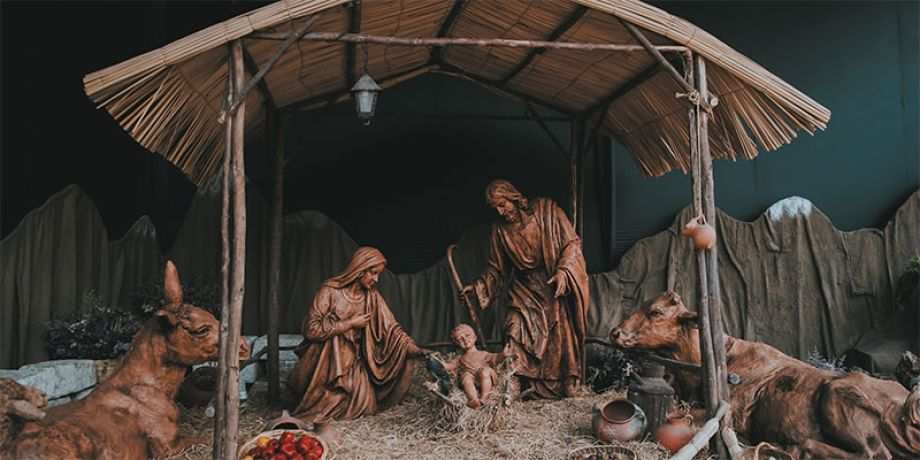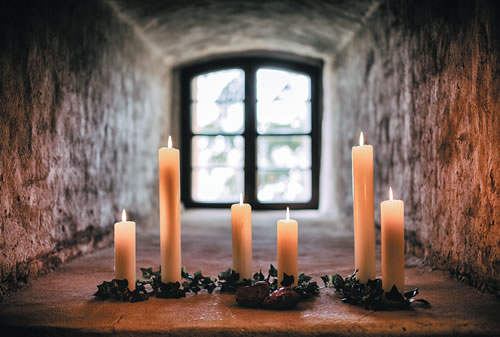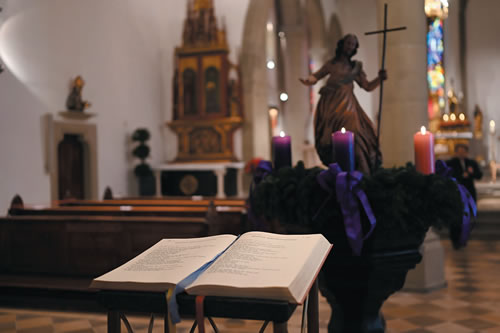
The liturgical life of the Church tells the story of what God is doing in the world. This may seem like a strange thing to say. Most of us grew up thinking that Mass was something we attended on Sunday because we had to. It seems to me that it takes a long time for us to see the connection between what we do on Sunday and what we do for the rest of the week.
Take Christmas, for example. What does the liturgical celebration of Christmas tell us about the world? It tells us the truth. It tells us that God so loved the world that He sent His only beloved Son. It tells us that God and the world and everything and everybody in it are united in love.
 If we go to Mass on Christmas and praise and thank God for the birth of Jesus in Bethlehem, we have done a good thing. It celebrates a great truth about our lives and history as human beings. By Boxing Day (December 26), maybe, we forget this most basic truth of our lives. This is why we repeat liturgical actions, and the repetition helps us remember and more deeply live into this deep story of our lives.
If we go to Mass on Christmas and praise and thank God for the birth of Jesus in Bethlehem, we have done a good thing. It celebrates a great truth about our lives and history as human beings. By Boxing Day (December 26), maybe, we forget this most basic truth of our lives. This is why we repeat liturgical actions, and the repetition helps us remember and more deeply live into this deep story of our lives.
Even if we do remember what happened in Bethlehem, we have not necessarily absorbed the full story of Christmas. This is that God not only came and embraced us once over two thousand years ago, but the same loving God is still embracing us. The liturgy tells the story of what God is doing all the time. It is an eternal truth.
I have had a minor light bulb moment recently. Sometimes we have major light bulb moments, but this is only a minor one but still illuminating. I attended a conference recently where Fr. Kevin O’Neill, a Columban from Geelong, was one of the keynote speakers, and his topic was “Intercultural Living.” As Columban missionaries, we, like all Christians, see sharing the Gospel of Jesus as the best thing we can do with our lives. We believe that the Spirit has invited us to go overseas and share the Gospel of Jesus with people there. What happens to us in this process is that we learn that the Gospel of Jesus can be lived in multiple ways. We also come to see that there are many more challenges to living the Gospel than we ever imagined.
 Fr. Kevin, from being on mission in Taiwan and China, came to see the importance of culture. That we cannot understand each other, that we have different foods and different customs, are all challenges if we wish to live in communion with the people of other cultures. The commandments, love God and love your neighbor, may sound great but cultural differences are obstacles to living this way. On the other hand, if we take time and make an effort, we can grow to like the food and speak something of the language.
Fr. Kevin, from being on mission in Taiwan and China, came to see the importance of culture. That we cannot understand each other, that we have different foods and different customs, are all challenges if we wish to live in communion with the people of other cultures. The commandments, love God and love your neighbor, may sound great but cultural differences are obstacles to living this way. On the other hand, if we take time and make an effort, we can grow to like the food and speak something of the language.
Living interculturally is a gift of the Holy Spirit. Again, the liturgy tells us this truth. In The Preface for Eucharistic Prayer for Reconciliation 2, this is stated clearly. “By your Spirit, you move human hearts … and peoples seek to meet together.” The liturgy tells the story of God’s action in the world. God is working in our hearts and minds to bring us together. What else would a God of love do? When we try to overcome the barriers of culture, when we strive to understand someone else from another culture, when we feel empathy and compassion for those from other countries, we are not doing this alone. The Spirit of the Lord is upon us. The Spirit is working in the other person and in us so that we can come together in friendship and mutual understanding. The Spirit is the love between the Father and the Son, and the Spirit has the same effect on us. We are brought together, and this is the source of our hope for our divided world.
The coming of Jesus into the world is the source of all the communion that our hearts long for. May each of us receive the joy and the peace that are his gifts to us not only now but always.
Columban Fr. Trevor Trotter is the Regional Director of Oceania.